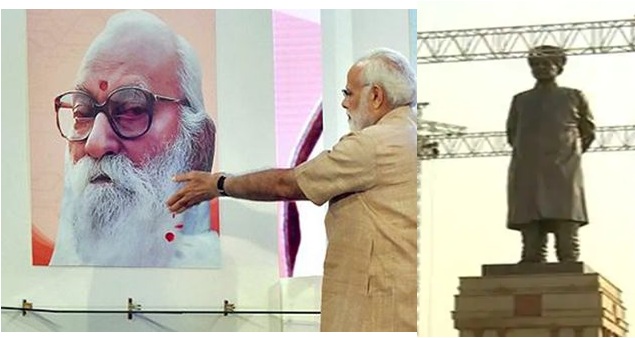If you open the history textbooks of any school in India today you are likely to find some prominent names such as that of Mahatma Gandhi, Jawaharlal Nehru and some other prominent leaders from the Congress who helped shape the country post Independence. There are however countless such heroes who gave their inputs in developing India and the nation in various ways. The agenda of the Congress had always been to sideline these so called social workers and political leaders who had dissented with the Congress’s ideology and approach towards India. This is exactly the reason why monuments, colleges and important buildings were named by the Congress only after members of the Nehru-Gandhi. Lal Bahadur Shastri, Sardar Vallabhbhai Patel and others of tall stature even within the Congress were systematically sidelined by the party in order to maintain the importance of the Nehru-Gandhi lineage in the country. BJP, on the other hand has always applauded the efforts of national icons rather than just appreciating the party icons. This is exactly why the Sardar Patel statue is being built by the BJP and not by the Congress as it should have. This is also the reason why Nanaji Deshmukh jayanti is being celebrated by the BJP today and why PM Modi had inaugurated the 64 foot tall statue of Sir Chhotu Ram upon his visit to Haryana a few days back.
Nanaji Deshmukh born in 1916 in Maharashtra was a social activist and one of the most prominent RSS workers in the country. His greatness lies in the fact that his influence was not just restricted to the state of Maharashtra but his hard work and social activism made him a prominent figure of central politics. His extensive hard work in Rajasthan and Uttar Pradesh in introducing the ideology of Sangh in eastern UP was recognized within the cadres and that is how he became the managing director of Rashtra Dharma and Panchjanya, which were journals of the RSS. Former PM Atal Bihari Vajpayee was assigned the role of editor while Pandit Deen Dayal Upadhyaya was leading the team which Nanaji Deshmukh had joined. The biggest contributions from Nanaji Deshmukh to the upliftment of Indian society came from his efforts in establishing the first Saraswati Shishu Mandir in Gorakhpur in 1950. The chain of Saraswati Shishu Mandir in the country today owes a lot to Nanaji Deshmukh and his will to uplift the society. Nanaji Deshmukh had also proved instrumental in making the Bharatiya Jana Sangh a prominent political body in the country and especially UP. His organizational skills combined with Atal Bihari Vajpayee’s oratory skills were instrumental in uprooting the Congress from UP. He also participated with gusto in the JP movement and yet had declined the cabinet minister post offered to him in the central government. Nanaji Deshmukh retired from active politics as soon as he turned 60 and devoted his life to social work. Having retired from active politics he went on to serve the Deendayal Research Institute, he bid goodbye to this venture to settle down in Chitrakoot where he started a school called Chitrakoot Gramoday Vishwavidyalaya which was India’s first rural university where he breathed his last.
Sir Chhotu Ram too was a prominent leader from modern day Haryana who fought against the atrocities on farmers in colonized India. His stature in the politics of Haryana is unparalleled and he is therefore revered by one and all alike. The unveiling of Chhotu Ram’s statue in Rohtak, Haryana is a mark of respect to the great leader by the BJP and his grandson Union Steel Minister Birender Singh. Regarding the plight of farmers, Chhotu Ram had written in his journal, the Jat Gazette, “People describe the farmer as the Lord of Grain (Annadata), but no one sees whether he himself eats or not. It is the biggest wonder of the world that the one who produces remains hungry. I tell the Rajas-Nawabs and all types of governments of Hindustan to not harass the farmer to the extent that he stands up… Other people break the law when they get angry with a government, but when the farmer would get angry, he would not only break the law, he would also break the back of the government.”
He stopped the exploitation of peasants at the hands of moneylenders by passing Punjab Regulations of Accounts Act, 1930, which were followed by Punjab Debtors Protection Act of 1936 and the Punjab Relief of Indebtedness Act, 1943. Chhotu Ram made sure that the laws were not only created but also implemented. Affectionately called Deen-bandhu and Rahbar-e-Azam by the peasants his popularity was not restricted to a caste or group in Haryana. Chhotu Ram had also set up schools in the villages where he hailed from and had tried to bring out farmers from the clutches of moneylenders and debt. Modern day Haryana owes a lot to Chhotu Ram for its agricultural and economic well being, one of the reasons why till date he remains a worshipped icon in Haryana.
BJP celebrated Nanaji Deshmukh jayanti and unveiled Chhotu Ram’s statue in Haryana to pay homage to the great leaders who have worked hard to change the society for better. Recognizing these role models of the society gives people hope and makes one believe that greatness is not limited to just one family. BJP should be applauded for making the current generation remember the contribution of these stalwarts who have shaped the way India functions today. Left to Congress these sons of the soil too would have faded into oblivion as per the wishes of the longest ruling party in the country.























